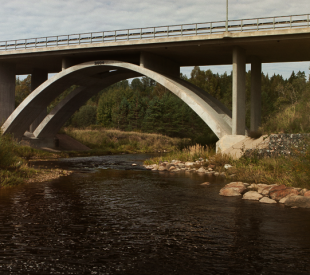COMPLEX RECONSTRUCTION OF THE
CITY OF SMILTENE’S STREETS, STAGE II
Smiltenes pilsētas ielu rekonstrukcija, kuras ietvaros atjaunotas brauktuvju konstrukcijas, nomainītas inženierkomunikācijas un uzstādīts jauns satiksmes organizācijas aprīkojums.
Latvijas valsts reģionālā autoceļa rekonstrukcija, par kuras izpildi SIA „8CBR” saņēma „Autoceļu Avīzes” Gada Balvu „Gada objekts 2014”.
Strenču pilsētas tranzītielu rekonstrukcija, kuras ietvaros atjaunotas brauktuvju konstrukcijas, izbūvēts rotācijas aplis un atjaunots tilts pār Strenčupīti.
Valsts galvenā autoceļa seguma atjaunošanas darbi satiksmes drošības uzlabošanai.
Completed work
EUR 2.56 million
Time of execution
June 2011 – November 2012
Customer
Smiltene District Council
General building contractors
SIA 8 CBR
COMPLEX RECONSTRUCTION OF THE CITY OF SMILTENE’S STREETS, STAGE II
Works under the auspices of Stage II of the complex reconstruction of roads in the City of Smiltene were commenced on 11 July 2011 and completed by 31 October 2012 on the following transit roads and stages of streets in the city:
- on Rigas Street from Kaikas Street to Gaujas Street;
- on Gaujas Street from Rigas Street up to the crossing of Audēju Street and Krāsotāju Street;
- at the crossing of Daugavas Street, Audēju Street and Valkas Street;
- on Dzirnavu Street, Stacijas Street and Vaļņu Street up to the crossing of Valkas Street.
During the course of reconstruction works, a water main was installed on the aforementioned street stages with house connection points (up to the red line), installing underground fittings. In addition, household sewerage and rainwater sewerage systems were built, existing household sewerage wells were redesigned, new street lighting was installed and low-voltage networks were rebuilt.
An asphalt surface was laid down on the aforementioned streets, improving their connection to less important streets and other infrastructure facility site territorial connections. Furthermore, combined pedestrian-cycling paths were built, public transport stops were built, and a traffic organisation system was established including road signs, road and pedestrian metal safety barriers, horizontal designations, and lighting that was installed next to pedestrian crossings.
Completed work
 carriageway asphalt surface layer construction: 32,000 m2;
carriageway asphalt surface layer construction: 32,000 m2;
 paving stone surface construction: 13,200 m2;
paving stone surface construction: 13,200 m2;
 chipping base construction: 89,700 m2;
chipping base construction: 89,700 m2;
 freeze resistant layer construction: 22,400 m3;
freeze resistant layer construction: 22,400 m3;
 rainwater drainage construction: 1847 m;
rainwater drainage construction: 1847 m;
 water mains construction: 2,421 m;
water mains construction: 2,421 m;
 household sewerage: 1,308 m;
household sewerage: 1,308 m;
 lighting networks: 3,905 m;
lighting networks: 3,905 m;
 concrete carriageway curbs: 15,800 m;
concrete carriageway curbs: 15,800 m;
 culvert construction: 194,5 m;
culvert construction: 194,5 m;
 pedestrian protective barriers: 1,235 m.
pedestrian protective barriers: 1,235 m.








